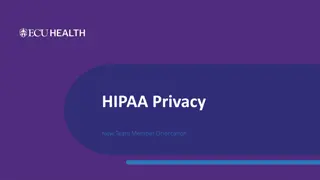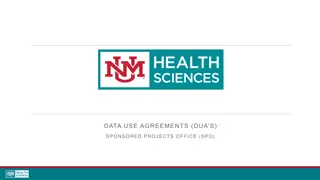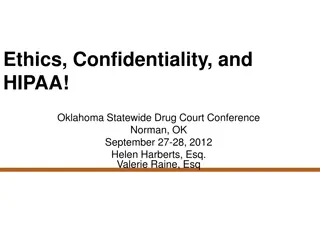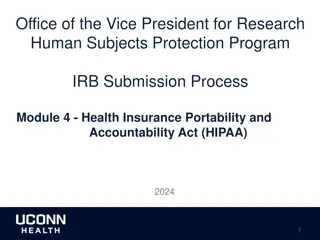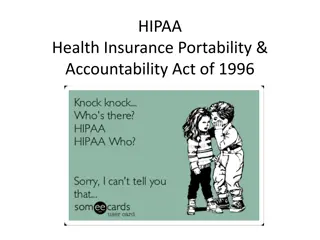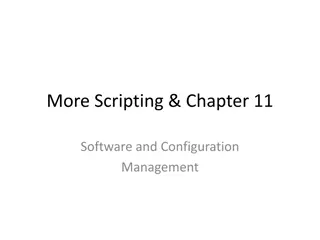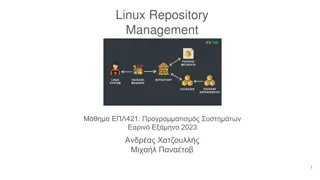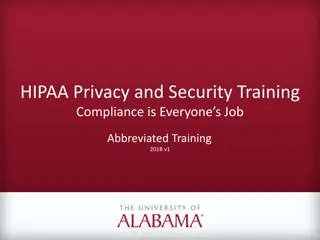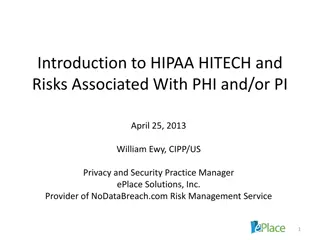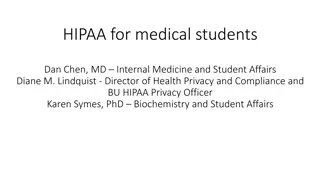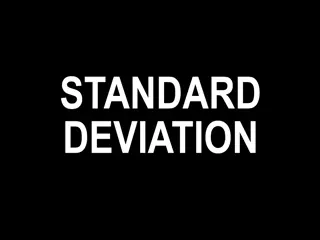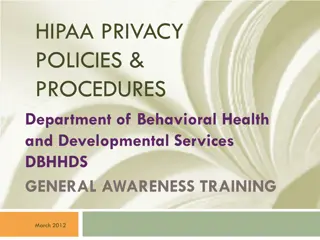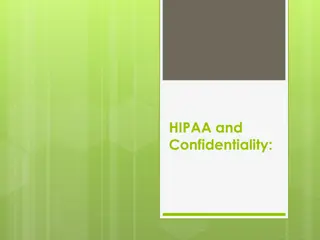HIPAA Standard Training Package for Health Information Protection
This training package covers key aspects of the Health Insurance Portability and Accountability Act (HIPAA), such as the purpose of the HIPAA Privacy Rule, who is covered under HIPAA, what is covered as protected health information (PHI), and what is not covered by HIPAA. It emphasizes the importance of safeguarding individuals' health information while ensuring the necessary flow of information for quality healthcare provision.
Download Presentation

Please find below an Image/Link to download the presentation.
The content on the website is provided AS IS for your information and personal use only. It may not be sold, licensed, or shared on other websites without obtaining consent from the author.If you encounter any issues during the download, it is possible that the publisher has removed the file from their server.
You are allowed to download the files provided on this website for personal or commercial use, subject to the condition that they are used lawfully. All files are the property of their respective owners.
The content on the website is provided AS IS for your information and personal use only. It may not be sold, licensed, or shared on other websites without obtaining consent from the author.
E N D
Presentation Transcript
HIPAA Updated Standard Training Package 1 September 2024
TOPICS OF DISCUSSION Health Insurance Portability and Accountability Act (HIPAA) Military Command Exception 2 Current as of 1 January 2019
Purpose of HIPAA Privacy Rule A major goal of HIPAA is to assure that individuals health information is properly protected while allowing the flow of health information needed to provide and to promote high quality health care. HIPAA strikes a balance that permits important uses of information, while protecting the privacy of people who seek health care. 3 Current as of 1 January 2019
Who is Covered? Business Associate (BA) A person or entity that is not a member of the covered entity s workforce, that performs a function or activity for the covered entity using PHI (e.g., independent medical transcriptionist, Garrison legal office, DOJ, managed care support contractors) BA Agreement A BA may not use or further disclose such information in violation of statute/regulation Not needed if individual/office covered by the DoD Regulation 4 Current as of 1 January 2019
What is Covered? Protected Health Information (PHI) Individually identifiable health information including demographics, in electronic, paper or oral medium Held by covered entities or their business associates Relates to the past, present, or future - Physical or mental health of an individual Provision of health care to an individual Payments for health care Can be used to identify the individual or there is a reasonable basis to believe it could be used to identify the individual MTF/Unit Surgeon s responsibility is to protect & safeguard a patient s PHI 5 Current as of 1 January 2019
What is not covered by HIPAA? Drug testing program of DoD Provision of healthcare to foreign national beneficiaries of MHS OCONUS DNA repository Provision of healthcare to enemy POWs and other detainees Education records maintained by DoDs schools Records maintained by DoD day care centers Military Entrance Processing Stations Reserve component medical activities outside the MTF 6 Current as of 1 January 2019
General Prohibition PHI shall not be used or disclosed UNLESS patient provides an authorization OR under specifically permitted purposes. Standard Uses and Disclosures of PHI: To the individual For treatment, payment, or health care operations (TPO) Pursuant to an authorization As specifically permitted by the HIPAA Privacy Rule 7 Current as of 1 January 2019
Minimum Necessary The HIPAA Privacy Rule requires covered entities to take reasonable steps to limit the use or disclosure of, and requests for, PHI to the minimum necessary to accomplish the intended purpose. The Minimum Necessary rule does not apply to the following: Disclosures to or requests by a health care provider for treatment, payment, or healthcare operations purposes Disclosures to the individual who is the subject of the information Uses or disclosures made pursuant to an individual s authorization Uses or disclosures that are required by other laws 8 Current as of 1 January 2019
Specifically Permitted Disclosures For the permitted uses and disclosures listed below, a patient s opportunity to agree or object is not required: Victims of abuse, neglect or domestic violence Health oversight activities Workers compensation Research (minimal risk) Public health activities About decedents Cadaver organ, eye or tissue donation purposes As required by law Avert serious threats to health or safety Specialized government functions Judicial and administrative proceedings Law enforcement purposes 9 Current as of 1 January 2019
Disclosure for Healthcare Operations Carrying out the following activities of the covered entity: Quality Assurance Activities Reviewing the competence or qualifications of health care professionals Medical review, legal services and auditing functions Management and general administrative activities (i.e., customer service) Population-based activities relating to improving health or reducing healthcare costs Contacting of healthcare providers and patients with information about treatment alternatives Conducting healthcare training programs 10 Current as of 1 January 2019
The Military Exception Army policy is to support a CDR's need for health information to support his/her mission. Commander or designee must exercise authority over Soldier Commanders are not authorized unfettered access to a Soldier's PHI - only authorized medical information that limits the Soldier's ability to perform his duty. Does not apply to civilians, retirees, or family members. The Privacy Rule is permissive there is no duty to disclose a Soldier's PHI. 11 Current as of 1 January 2019
The Military Exception PHI may be used or disclosed for activities deemed necessary by appropriate military command authorities to assure the proper execution of the military mission. These are generally used to: determine the Soldier s fitness for duty, determine the Soldier s fitness to perform any particular mission, report on casualties in any military operation, or carry out any other activity IAW applicable military regulations or procedures. 12 Current as of 1 January 2019
Fitness for Mission PHI may be used or disclosed to determine the Soldier's fitness to perform any particular mission, assignment, order, or duty, including compliance with any actions required as a precondition to performance of such mission, assignment, order, or duty. Communicate via profile form. Examples: To report results of physical examinations and profiling IAW AR 40- 501, e.g., Soldier is prescribed medication that interferes with performance of duties, such as driving or carrying a weapon. To medically administer flying restrictions Meets medical standards for deployment Pregnancy, diabetes requiring oral medication for control,seizure disorders, cardiac arrhythmias, permanent pacemakers, asthma, history of heat injuries, etc. 13 Current as of 1 January 2019
Disclosure to Command Authorities If use is not by Commander personally, the Commander must designate user in writing No access to psychotherapy notes without patient authorization MTF required to account for disclosures made to commander/unit Legal Counsel should act as honest broker if dispute between CDR & MTF/Unit Surgeon Only release medical conditions that affect the Soldier's fitness for duty/mission Prescription for birth control medication/self-referral to mental health not required for duty/mission 14 Current as of 1 January 2019
MTF Will Inform Command of a Soldier s Condition Injury indicates a safety problem or a battlefield trend Risk of heat/cold injury Seriously ill or very seriously ill Prescribed medications that could impair performance (may cause drowsiness or dizziness, unsafe to drive, inhibit reaction time, etc.) Medical condition impairs duty performance Heat Stroke; profile restrictions; Serious risk of harm to a specific military operational mission to include cognitive deficits that could result in inadequate judgment. * MTF Commander and/or unit surgeon will proactively inform a commander of a Soldier s medical condition within 24 hours 15 Current as of 1 January 2019


